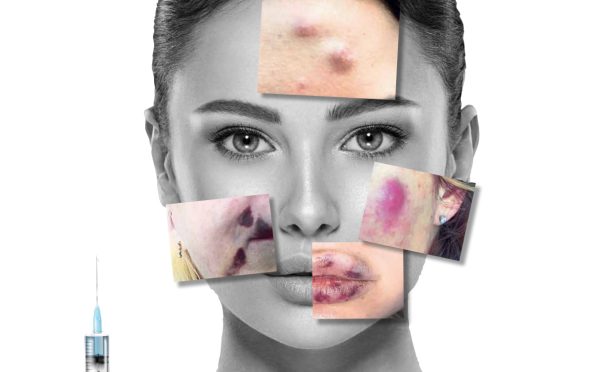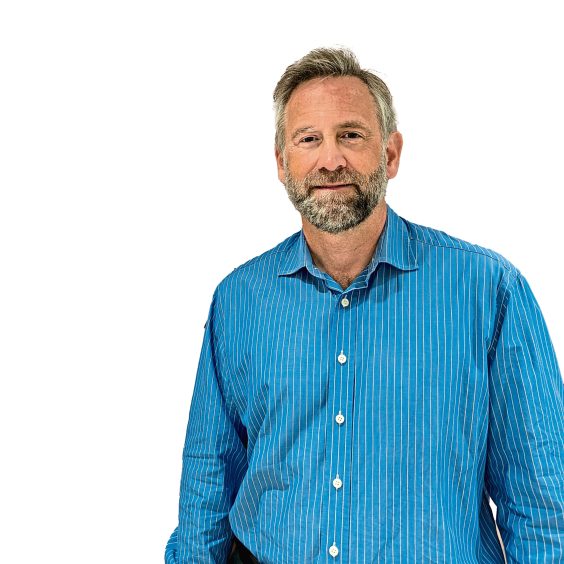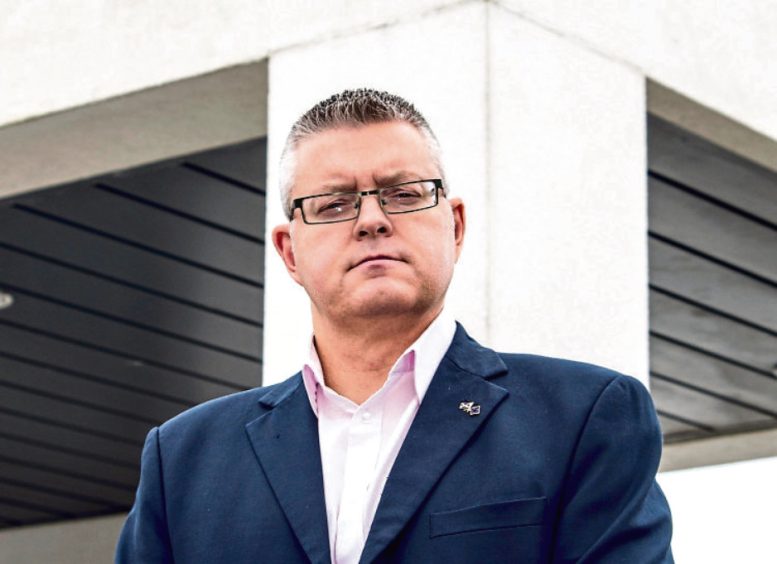
Criminals have infiltrated the £400 million beauty industry in Scotland, creating a burgeoning black market with unlicensed and counterfeit botox and fillers from South Korea and China.
Because of the lack of regulation in Scotland, social media is awash with dangerous products that can cause blindness or disfigurement, as well as “£20 skinny jabs” that may contain deadly levels of insulin rather than the ingredients found in prescribed weight-loss injections, which cost 10 times more.
Meanwhile, there are fears unlicensed practitioners could spread infections such as hepatitis or HIV, as some reuse the same vial of filler or botox on a series of customers.
Last week we told how campaigners were calling for urgent action on Scotland’s unregulated botox and fillers industry – which experts say is the worst in Europe.
Now we can reveal the alarming extent to which organised crime gangs have moved into this lucrative market – and the measures they will take to protect their stake.
‘The threats are very real’
One whistleblower was threatened with having her business firebombed after attempting to raise the alarm over dangerous practices.
Another legitimate licensed practitioner from Edinburgh was left in fear from a barrage of intimidation after she raised concerns. She said: “The threats are very real.
“Those who speak up and try to warn the public about the dangers of allowing someone who isn’t properly trained to put needles in their face using unlicensed and possibly counterfeit products, are being targeted and intimidated.
“It’s happened to me several times. Another practitioner I know was recently warned her clinic would be set on fire. It’s terrifying.
“The Scottish Government was warned 10 years ago this would happen unless they brought in legislation to properly regulate the industry to protect clients and practitioners who undergo years of training to ensure the provide a safe service. But the government did virtually nothing. It let this happen.
“Now legitimate practitioners who have invested money and years training, the ones who act responsibly by refusing to treat under-18s, are being targeted and threatened for speaking up.”
The botox and filler market has become a key target for criminal gangs, who can make more money from selling lip fillers and skinny jabs than they can from more traditional criminal activities – but with very little risk of prosecution.
It is also appealing to criminals as much of the industry is a cash business, as people are more likely to keep the fact they are receiving treatment a secret and avoid statements on their bank card.
Beauty experts reckon unlicensed providers outnumber legitimate licensed practitioners three to one, with one-quarter of procedures being done in someone’s home rather than a proper clinic.
In one criminal raid two months ago, thousands of pounds worth of dermal fillers, botox, and needles were seized from an industrial warehouse in the north of Glasgow.
Andy Morling, Deputy Director of Criminal Enforcement at health watchdog the MHRA, said: “Medicines like these are dangerous in the wrong hands, potentially leading to serious adverse health consequences. The criminals are not only breaking the law, they also have no regard for people’s safety.”
Unlicensed products
Even licensed practitioners are not immune to being duped as reports are increasing of criminals showing up at their clinics offering cut-price products.
Hamish Dobbie, of the Scottish Medical Aesthetics Safety Group, said: “We know unlicensed product is streaming in from South Korea and China, and we know an unsavoury element in this country are cashing in as there is little chance of jail time.
“Because these products are unlicensed and counterfeit, who knows what is in them, whether they are made in a filthy backstreet warehouse, or whether they contain harmful ingredients that could cause serious health risks.
“These products are then marketed here through social media, nail bars, even in some hairdressers. Along with their coffee, customers in some of those places are being asked if they want botox, fillers or weight-loss jabs.
“Social media is full of posts encouraging people with offers so cheap they sound hard to resist. But there are many real dangers from untrained practitioners who can cause disfigurements using products making claims that cannot be verified.
“If an untrained practitioner injects your face with fillers, there can be a high risk of vascular occlusion, which can lead to necrosis, tissue death and disfigurement.
“There is also a risk of blindness if an untrained person injects nears the eyes.
“There have also been cases in Scotland of surgical procedures such as the Brazilian butt lift and breast augmentation where there are increased risks of sepsis and other life-threatening side effects.
Concerned practitioners, who are licensed through Healthcare Improvement Scotland, have been lobbying the government for change.
Dobbie said: “In 2016, the Scottish Government was leading the UK in implementing regulation. But they have fallen behind, making our country the least regulated in Europe.
“New regulations in England banned the use of injectables for beauty purposes on under-18s. But, because there is no such regulation here, border-hopping has become a particular concern because unscrupulous practitioners are offering to do it.
“We’d like to see some cross-party support and action from the Scottish Cosmetic Intervention Expert Group appointed by the government to move quickly and follow what England has done to protect under-18s, who are the most impressionable and vulnerable.”
Facebook and TikTok are awash with injectables offered at knockdown prices.
But Dobbie said: “If something goes wrong, we’ve heard of people being threatened to keep quiet.
“Because procedures have been made to sound as commonplace as putting on lipstick, people don’t realise the associated risks. A number of people taking unlicensed weight-loss jabs have already suffered life-threatening incidents.”
They include Jennifer Clare Finestone, 37, from Baillieston, Glasgow, who suffered a mini-stroke after unwittingly taking a fake weight-loss jab offered on social media.
Jennifer collapsed and was paralysed, leaving her unable to even call for help. She later managed to get a message to a friend, and she was rushed to Monklands Hospital.
The fake £20 weight-loss pen almost killed her as it contained insulin rather than the licensed medication used by the medical manufacturers of Saxenda, which costs about £200 a month and requires to be prescribed.
Dobbie said: “There is particular concern about unregulated injectable slimming products openly advertised on social media.
“Because some are categorised as beauty products, medical regulators are not taking action.”
Scottish Conservative Shadow Social Justice Minister Miles Briggs said bad practices could lead to a major public health crisis.
“One of the more worrying aspects is that we could be looking at an explosion of blood-borne infection such as hepatitis C or HIV because there is an untrained army of people injecting fillers who think that, by just using a new needle with every customer, they are safe.
“In fact, every time a needle goes back into a vial of filler, body fluid is returned from each customer.
“You don’t just need new needles for every person, you need a new vial. We know from the experts we speak to that these cowboys won’t be throwing away vials with product left in as that will cost them money.
“These are the type of people who are offering the cheapest deals after doing an online course, injecting people in their own homes. I’ve even heard of vape shops doing a secret roaring trade in fillers round the back of their shop.
“We need the Scottish Government, the police and agencies like the MHRA to be working together to find a way to protect the public from the criminal element and those putting people at risk, but right now the issue doesn’t seem to be as high on their agenda as it should be.”
The Scottish Government said: “This is a fast-changing sector, which is why we are working with key stakeholders to consider the potential scope of further regulation and make sure we get the detailed specifics right.
“Just last month new secondary legislation commenced, further regulating some independent healthcare services including non-surgical cosmetic procedures provided by pharmacists and pharmacy technicians.”
NHS faces huge bill for life-saving operations
Botched procedures by beauty cowboys are costing the NHS millions.
But nobody is counting the cost of the often life-saving operations needed to correct Brazilian butt lifts that go wrong, or badly placed fillers that could cause blindness or disfigurement.
Beauty experts and politicians are fuming at the oversight, which leaves taxpayers paying millions simply because the system is not designed to identify botched cosmetic procedures.
The SNP’s Stuart MacMillan, MSP for Inverclyde, said: “If a patient arrives at hospital needing help with a heart attack, or they need a hip replacement, the NHS uses a code that allows the system to verify how many procedures have been done and what the cost is.
“Unfortunately, the system does not have a specific code for treating cosmetic procedures that have gone wrong, so we cannot tell how many the NHS is seeing, how many people are affected, and how much it costs.
“I have been calling for this to be rectified as a matter of urgency so we can see how many people are being harmed or are having to undergo medical treatment to correct procedures.”
The British Association of Aesthetic Plastic Surgeons say botched overseas surgeries cost the NHS more than one million pounds a year.
Repairs for a botched non-surgical Brazilian butt lift cost £15,000-£100,000.
MacMillan said the Scottish Government is determined to do what it can to regulate the industry as the country becomes Europe’s hotspot for unlicensed, unregulated treatments.
He said: “We are also concerned about the unregulated side and what is happening there.
“We need primary legislation to tackle these issues.
“If there is a way to encourage practitioners to up-skill so we see far more undergoing training, that will make things safer.”
The Scottish Government said NHS Scotland uses an “international coding system owned by the World Health Organisation” that cannot be immediately changed.
It said the lack of specific code for botched cosmetic procedures and injectables “has been recognised as a problem” that it will be addressing.

Enjoy the convenience of having The Sunday Post delivered as a digital ePaper straight to your smartphone, tablet or computer.
Subscribe for only £5.49 a month and enjoy all the benefits of the printed paper as a digital replica.
Subscribe
 © Pamela Marshall
© Pamela Marshall